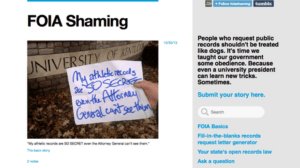Transparency Watch
To speed up ‘FOIA slowpokes,’ journalists mix praise and shame
When I was a reporter at a daily newspaper in Virginia, few things frustrated me more than slow responses to Freedom of Information Act requests. I’d put in my request and wait the allotted response time only to receive a handful of excuses. Sometimes, after weeks of nagging, I’d get the documents. Other times my…
Read MoreNJ court fact-finder recommends Gannett get its due for winning public records fight over PDFs
If a judge agrees with a court fact-finder, Gannett New Jersey could be getting $542,000 in legal fees stemming from a public records lawsuit. Gannett filed suit in 2009 after several newspapers asked for municipal payroll records in an electronic format, not PDFs. In August 2012 the company won the “precedent-setting case.” As for the…
Read More18 Chris Christie investigations coming to a publication near you
WNYC today compiled a clever list of “18 ways Christie and his officials have blocked access to information.” The release of the subpoenaed documents “exposed the Christie Administration’s involvement in Bridgegate show how the Governor’s Office has been keeping its decisions and expenditures quiet despite laws that require official business to be made public.” The…
Read MoreCourt rules in favor of S.D. paper, allows access to food stamp data
A federal appeals court has ruled that Argus Leader Media can seek government data on how much businesses take in from the food stamp program, the Sioux Falls, S.D. paper reported. On Tuesday, the U.S. Court Appeals for the Eighth Circuit reversed a district court ruling and determined that a federal statute that created the food stamp program does not…
Read MoreAmid drug scandal, Toronto officials keep secret hundreds of emails
The Toronto Sun is appealing a decision by the City of Toronto to withhold hundreds of emails sent by staff members of beleaguered Mayor Rob Ford. The paper requested copies of emails sent and received by Ford’s former senior staffers around the time the mayor’s crack video scandal broke last year. From the Sun: The…
Read MoreVirginia Supreme Court overturns blackout, opens public access to audio recordings of oral arguments
Members of the Virginia Supreme Court have a New Year’s Resolution — become more transparent. Starting this year, members of the public will finally have access to audio recordings of oral arguments. The recordings were once public, but installation of new recording equipment in January 2008 changed that. As the Alexandria Gazette Packet first reported last summer,…
Read MoreOregon State fights media adviser’s request for records
Oregon State University student media adviser Kate Willson thought she was just doing her job when she filed a public records request with the university. Now she’s worried it could get her fired. OSU’s chief spokesman says Willson’s job is safe and the university was not trying to muzzle her. But he also says Willson…
Read MoreA fight for newborn screening data across the country
By Ellen Gabler Since June, the Milwaukee Journal Sentinel has been fighting for important data that affects babies born in every state and the District of Columbia. Data we’ve received so far was the backbone to this investigation into delays in the nation’s newborn screening programs and other related stories. But about two dozen states…
Read MoreMuzzling the Freedom of Information Act
The federal government is making it increasingly difficult, and prohibitively expensive, for journalists to get files that agencies want to keep secret, despite President Obama’s pledge of transparency, IRE President David Cay Johnston writes for Newsweek. That’s bad news for authors, editors, producers, writers, and publishers, as well as anyone else interested in democratic government.…
Read MoreA FOIA Victory for Sunlight and Spending Transparency
Earlier this week, the Sunlight Foundation filed its very first Freedom of Information Act (FOIA) lawsuit. In May 2013, they sent a FOIA request to the General Services Administration (GSA) requesting a copy of all contract notices that had been posted on FedBizOpps.gov since 2000. These notices would allow members of the press, researchers and our developers to…
Read More
